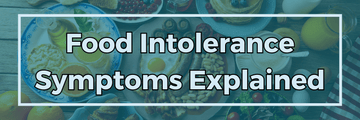What is food intolerance?
Food intolerance, also known as food sensitivity, occurs when you have difficulty digesting a specific type of food or different types of foods. Often, food intolerance results in gastrointestinal symptoms like gas, diarrhoea, stomach pain, and others. Food intolerance or sensitivity is often not serious. However, it causes symptoms that can make you uncomfortable, hindering your ability to do daily activities. Food intolerance is often a result of the body being unable to digest food properly or that particular food irritating the digestive tract.Common causes of food intolerance
Experts need to find out why people develop food intolerances. However, some people get them because the body produces insufficient enzymes or chemicals to break down that specific food. When food isn't broken down in the small intestines, it's then moved into the colon, where it causes food intolerance symptoms that we often experience. Some people, however, have a gut that is sensitive to specific types of foods or ingredients, and upon consumption of such foods, the gut experiences symptoms. In such cases, you must avoid these foods that cause intolerance symptoms.
Some people, however, develop food intolerances following the development of specific conditions such as Crohn's disease, ulcerative colitis, and inflammatory bowel disease. There could also be more conditions that can cause food intolerances.
The conditions that can result in food intolerances affect the intestinal tract in one way or another. When the intestinal lining of your stomach is damaged, it cannot produce chemicals to break down food, and hence your body experiences symptoms as it tries to get rid of th undigested food.
However, once you get a diagnosis for these underlying conditions and treat them, you can cure food intolerance because your intestinal wall health will be restored, and your body can easily produce chemicals to break down those foods that it couldn't.
Some people, however, have a gut that is sensitive to specific types of foods or ingredients, and upon consumption of such foods, the gut experiences symptoms. In such cases, you must avoid these foods that cause intolerance symptoms.
Some people, however, develop food intolerances following the development of specific conditions such as Crohn's disease, ulcerative colitis, and inflammatory bowel disease. There could also be more conditions that can cause food intolerances.
The conditions that can result in food intolerances affect the intestinal tract in one way or another. When the intestinal lining of your stomach is damaged, it cannot produce chemicals to break down food, and hence your body experiences symptoms as it tries to get rid of th undigested food.
However, once you get a diagnosis for these underlying conditions and treat them, you can cure food intolerance because your intestinal wall health will be restored, and your body can easily produce chemicals to break down those foods that it couldn't.
What are the symptoms of food intolerance?
Symptoms of food intolerance take time to appear, starting after a few hours or a few days. However, the severity of these symptoms depends on how much food you've consumed. The more you consume foods you're intolerant to, the more severe your symptoms will be. Common symptoms of food intolerance include:- Joint pain
- Diarrhoea
- Stomach pain
- Gas
- Headache
- Runny nose
- Bloating
- Malaise












